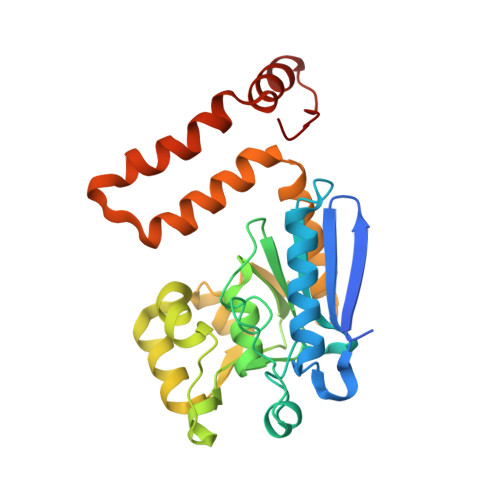Host-mediated ubiquitination of a mycobacterial protein suppresses immunity.
Wang, L., Wu, J., Li, J., Yang, H., Tang, T., Liang, H., Zuo, M., Wang, J., Liu, H., Liu, F., Chen, J., Liu, Z., Wang, Y., Peng, C., Wu, X., Zheng, R., Huang, X., Ran, Y., Rao, Z., Ge, B.(2020) Nature 577: 682-688
- PubMed: 31942069
- DOI: https://doi.org/10.1038/s41586-019-1915-7
- Primary Citation of Related Structures:
6LDZ - PubMed Abstract:
Mycobacterium tuberculosis is an intracellular pathogen that uses several strategies to interfere with the signalling functions of host immune molecules. Many other bacterial pathogens exploit the host ubiquitination system to promote pathogenesis 1,2 , but whether this same system modulates the ubiquitination of M. tuberculosis proteins is unknown. Here we report that the host E3 ubiquitin ligase ANAPC2-a core subunit of the anaphase-promoting complex/cyclosome-interacts with the mycobacterial protein Rv0222 and promotes the attachment of lysine-11-linked ubiquitin chains to lysine 76 of Rv0222 in order to suppress the expression of proinflammatory cytokines. Inhibition of ANAPC2 by specific short hairpin RNA abolishes the inhibitory effect of Rv0222 on proinflammatory responses. Moreover, mutation of the ubiquitination site on Rv0222 impairs the inhibition of proinflammatory cytokines by Rv0222 and reduces virulence during infection in mice. Mechanistically, lysine-11-linked ubiquitination of Rv0222 by ANAPC2 facilitates the recruitment of the protein tyrosine phosphatase SHP1 to the adaptor protein TRAF6, preventing the lysine-63-linked ubiquitination and activation of TRAF6. Our findings identify a previously unrecognized mechanism that M. tuberculosis uses to suppress host immunity, and provide insights relevant to the development of effective immunomodulators that target M. tuberculosis.
Organizational Affiliation:
Shanghai Key Laboratory of Tuberculosis, Shanghai Pulmonary Hospital, Tongji University School of Medicine, Shanghai, China.














